I have known many remarkable women in my life, starting with my mother and grandmother. Grandmother was a spiritual woman who reached out and touched lives; my mother rescued animals. As an author, I write about remarkable women.
These past few months, I have had the privilege to work with three women much like my grandmother and my mother: my adopted sister, Lois, a very spiritual Native American woman; and Shari Bond and Jackie Glover of Cross Creek Alpaca Rescue. Lois was friends with an 84-year-old man, Walter, who had 58 alpacas when he went into the hospital. Since Walter didn’t have any family close-by, Lois became his patient advocate as well as cooking him meals as he couldn’t always eat the hospital food, and taking over the care of his 58 alpacas. At 76-years old, my sister is a tiny woman, barely five-foot tall and weighing around a hundred pounds. 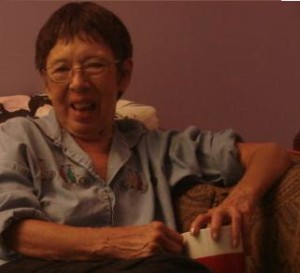 The schedule she took on was grueling.
The schedule she took on was grueling.
One afternoon when my wife, Deva, and I had gone to Sedro Woolley to visit Lois we finally realized the extent of the project she had taken upon herself:
Walter was not coming home. Ever. His alpacas had not been sheared in two years; 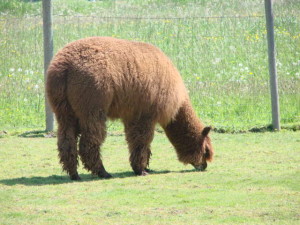 (note the excessively heavy fiber on this animal. Poor animal had no way to cool off and the excess fiber hid the fact that they had been starving) they had not been getting enough to eat; and they had several other health issues. And they all needed rehomed ASAP! As Lois researched finding homes she met despair. The alpaca industry in the United States was in a many-years-long slump; alpacas flooded the market; there were no homes available. Several people suggested that she load the animals up and truck them to auction to be sold off as dog food on the hoof.
(note the excessively heavy fiber on this animal. Poor animal had no way to cool off and the excess fiber hid the fact that they had been starving) they had not been getting enough to eat; and they had several other health issues. And they all needed rehomed ASAP! As Lois researched finding homes she met despair. The alpaca industry in the United States was in a many-years-long slump; alpacas flooded the market; there were no homes available. Several people suggested that she load the animals up and truck them to auction to be sold off as dog food on the hoof.  (note the bare pasture. All that grew there was inedible weeds) Other people suggested that she have all of the animals euthanized. My sister was devastated. And exhausted from months of caring for the animals and months of running back and forth to help feed and take care of her friend, Walter.
(note the bare pasture. All that grew there was inedible weeds) Other people suggested that she have all of the animals euthanized. My sister was devastated. And exhausted from months of caring for the animals and months of running back and forth to help feed and take care of her friend, Walter.
Lois was so busy giving that she forgot to ask others for help. Fortunately, when Deva understood the overwhelming scope of the project, she volunteered to help with the animals. That night, Deva went online and found the Cross Creek Alpaca Rescue. http://www.facebook.com/foralpacas She immediately contacted Shari Bond. Shari quickly responded. So began Deva and my months’ long journey in helping Lois and the alpacas.
At first, Walter’s son–a grown man who lives out of state–blocked all attempts to rehome the alpacas, mistakenly believing that each animal was worth thousands of dollars. Lois finally found a way around that. First big hurdle in the way of rehoming the alpacas had been crossed!
The next issue: the alpacas, which had been badly neglected and starved until my sister took over their care, and some had health issues, could not be transported before they were sheared or the combination of poor condition and heat while un-sheared could kill them.
Anyone who meets Lois recognizes the goodness within her. Andre, who had been friends with Walter and knew Lois stepped in and paid for the shearing. 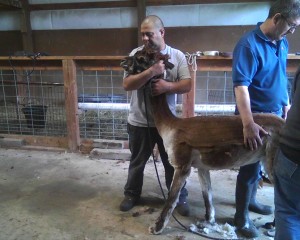 (these wonderful men knew Lois and came to help. Andre paid for the shearing–in blue shirt–as well as physically helped during the shearing. Note the gentleness of the man kneeling on the floor, comforting the baby alpaca during its first shearing)
(these wonderful men knew Lois and came to help. Andre paid for the shearing–in blue shirt–as well as physically helped during the shearing. Note the gentleness of the man kneeling on the floor, comforting the baby alpaca during its first shearing) 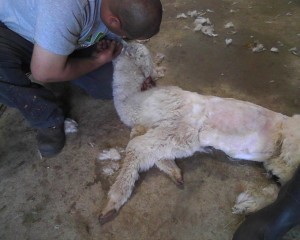 One more hurdle crossed!
One more hurdle crossed!
If you have ever tried to place even one animal in an ethical manner, you know that the long process of finding potential homes, screening potential adopters and finalizing the adoption can take weeks. With an animal species that is over-abundant this process can take months of hard work.
Shari and her business partner, Jackie Glover, began the process of finding suitable placements. Some of those who came forward–good people wanting to help–didn’t know anything about alpacas and their needs. Many had inappropriate fencing, such as barbed wire; others wanted to run alpacas and inappropriate livestock together which can result in the alpacas being seriously injured. Others simply didn’t know what they would be getting into until Shari and Jackie explained about the needs and requirements for alpacas. The pool of potential homes shrunk quickly. 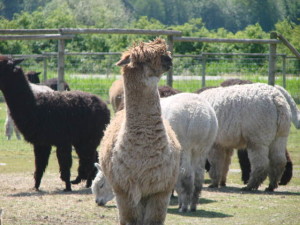
Meanwhile, back at the ranch….
Working herself into exhaustion and with limited income of her own, Lois searched for ways to pay people to help with the physical care of the animals; pay vet bills, and buy good hay. None of which comes cheap. She found some help she could afford by having garage sales and selling other items.
Deva and I began purchasing good hay from Dayville Hay in Snohomish and transporting it to the ranch. A small item off Lois’ list.
Next hurdle….
Intact male alpacas, unless they are intended for breeding purposes, are trouble. They argue and sometimes injure each other, and, in general, are more difficult to manage. In a poor alpaca economy intact males were definitely not a moving item. Gelding would cost $200 per animal. There was no money for gelding.
Shari and Jackie, got busy. They contacted Chuckanut Vet Hospital in Mount Vernon and found a compassionate vet who offered his services for the price of the supplies needed for each gelding. With 18 males the cost was still significant. Shari and Jackie got busy fundraising.
Meanwhile back at the ranch…..
Walter died. The ranch, which had been up for sale, now faced either a quick sale or a foreclosure. The animals had to be moved, and moved soon!
The gelding took place, but people who wanted alpacas were still scarce. One alpaca, Sammi, died after the gelding from pneumonia.
The alpacas were down to mere days before they had to be vacated.
Commitments made months earlier, before their involvement with these alpacas, claimed large portions of Shari and Jackie’s time. Tensions rose. Two of the placed alpacas literally dropped dead in their new home. All placements had to be put on hold until a necropsy could determine why these alpacas died.
The clock ticked inexorably forward, greedily consuming the hours, the days left.
The necropsy exposed disturbing medical facts. Blood tests had to be performed on all the alpacas at the ranch. Again, Shari contracted with the vet and Oregon State University to have blood drawn and tested. Days ticked by as we waited for the results.
Finally, the results green flagged the rehoming project. Another hurdle faced and overcome!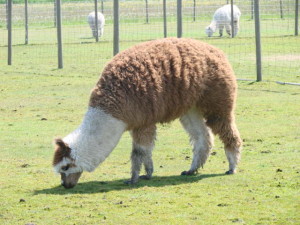 (I only have photos of the alpacas before shearing. Isn’t this one a beauty?)
(I only have photos of the alpacas before shearing. Isn’t this one a beauty?)
At last, we were down to eleven males and six females. But we only had days left. Shari and Jackie hustled. They shuffled the alpacas at their ranch, and at foster placements. They found new foster homes. And they decided that the three elderly (18-year-old) females would come home to live with them for the remainder of their lives. Lady Jane and her two cronies would not have to move ever again.
Shari and Jackie’s truck couldn’t haul their large trailer full of alpacas a hundred and fifty miles.
The hard deadline of Monday evening loomed ahead of us. Deva phoned Shari and volunteered to use our diesel truck to pull the large trailer.
Friday came. Deva finished work, went to a physical therapy appointment, we filled our cooler with juices and waters, and started south to pick up the big trailer at Cross Creek Ranch.
Friday night, Interstate 5 traffic between Darrington, Washington and Tenino, Washington sucks rotten lemons! We finally arrived and hooked up the trailer. Last minute discussions about meeting times concluded, we headed home.
Meanwhile back at the ranch….
The 13-year-old male, Leonardo, who had been a bag of walking bones, went down and wouldn’t stand up. Frantic phone calls ensued. Shari arranged an emergency call to the vet to see Leonardo.
Saturday morning. We arrive at the ranch. Leonardo is down in the pasture. Shari, Deva and I go over to see him. He finally gets up, one hind foot not touching the ground, back legs trembly weak, spine hunched in pain, eyes sunk from dehydration. It looks like we’ll lose Leonardo. A pall hangs over us as we wait with Lois for the vet to arrive.
The vet arrives. Checks Leonardo’s heart, lungs, gut sounds. Stands up and gives us the news: Leonardo can be saved!
A shot of Banamine for pain and instructions to Shari for rehydration, thiamine shots, internal parasite eradication, pain management and further care. Great news, but now we have to regroup.
Santiago 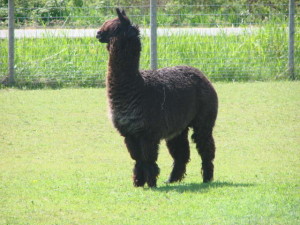 (lush grass outside the fence next to the busy road shows how barren the pasture is), one of the eleven males, cannot be with the other males as he attacks them. The plan had been for Shari to haul Santiago on her smaller trailer while Deva hauled the other ten males on the large trailer. Now, Leonardo needs to be hauled on the smaller trailer.
(lush grass outside the fence next to the busy road shows how barren the pasture is), one of the eleven males, cannot be with the other males as he attacks them. The plan had been for Shari to haul Santiago on her smaller trailer while Deva hauled the other ten males on the large trailer. Now, Leonardo needs to be hauled on the smaller trailer.
It wouldn’t be so difficult, but Shari had months ago arranged for a gelding clinic at OSU for fifteen alpacas that she committed to hauling to the clinic. They have to arrive early morning on Tuesday. She has to pick them up at various locations around the state, and get them there. She had planned to use Sunday and Monday to gather the alpacas. Now, she had to adjust her extremely tight schedule. Leonardo needed her help.
Deva and Shari decided on a plan: Leonardo would ride in Shari’s trailer and Deva would haul the other nine males. Sunday Shari would return to pick up Santiago and Deva would haul the six females.
Night had fallen by the time, Deva drove into Centralia and the home for the last of the five males on the trailer. Shari, Jackie and a man with a headlamp met us at the driveway and directed us into a dark pasture. In an adjoining pasture, horses pressed against the fence, curious about the commotion in the field next to them. We unloaded the animals and headed out, leaving Shari and Jackie still talking to the man about the alpacas.
One in the morning, we arrived home. Our dogs tell us just what they think about our hauling in so late at night. I wonder as I toss and turn how Shari and Jackie do this day after day. How do they drive for hours on traffic clogged roads, deal with sick, neglected and sometimes brutalized animals; and drop into bed only to do it again and again? I can’t help but admire them.
Sunday morning arrived with brilliant blue skies and a friendly sun smiling upon us. Shari phoned. Leonardo had not pooped yet that morning. She could not leave until he did. Leonardo had been so dehydrated that one of the concerns was that his intestines would be clogged and that he could bloat. Pooping was an important medical sign…for better or for worse. Finally, Leonardo pooped, and we all rejoiced! Funny how something like that can bring such happiness.
Accidents all over the place on I-5 between Tenino and Bow, Washington, but Shari finally drove in through the ranch gates. Great news as she steps from her truck: Leonardo is doing well, eating, drinking, relaxing in the sun with his new bud next door.
The six females ran into the big trailer like they knew they were heading some place good. Shari haltered and led Santiago into her trailer. Good-byes were said. Lois, after caring for the alpacas for so long had a few tears in her eyes, but they were happy tears. The animals were finally safe.
If you would like to donate to a wonderful cause and help animals that desperately need you, contact Shari Bond at Cross Creek Alpaca Rescue.
FRIEND the alpacas! https://www.facebook.com/foralpacas
For VENDOR space at the Cross Creek Alpaca Rescue Bazaar contact Shari at ccar.crosscreek@gmail.com
Or, attend the bazaar, enjoy touring the rescue ranch while drinking cider and munching homemade treats! 10:00-4:00pm, Saturday, October 25th, 4225 Military Rd SE, Tenino, WA
To learn more about these wonderful people and their adorable rescued alpacas, go to http://www.crosscreekalpacarescue.org
A few more photos (pre-shearing. For more recent photos, visit Shari Bond’s facebook site: https://www.facebook.com/foralpacas) 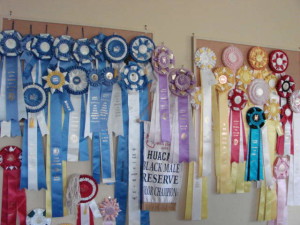 Many of these animals had been award-winning fiber producers.
Many of these animals had been award-winning fiber producers. 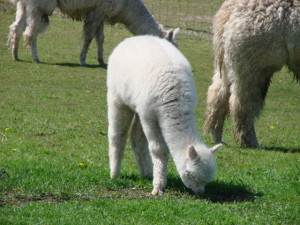 Franz, the last baby born before the rescue.
Franz, the last baby born before the rescue.  Note the uncomfortably thick fiber on this poor animal. And the weather was in the 80 to 90 degree range!
Note the uncomfortably thick fiber on this poor animal. And the weather was in the 80 to 90 degree range!
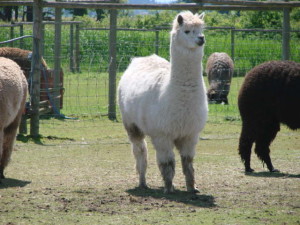 They need YOUR help! Will you help them? If you can help in any way–providing a permanent home, providing foster care, sending the money to feed one of them for six months or a year–please do so! Contact Shari Bond ccar.crosscreek@gmail.com
They need YOUR help! Will you help them? If you can help in any way–providing a permanent home, providing foster care, sending the money to feed one of them for six months or a year–please do so! Contact Shari Bond ccar.crosscreek@gmail.com
Don’t miss future posts. CLICK and FOLLOW!
To connect with Aya, FRIEND her on facebook: http://www.facebook.com/ayawalksfar